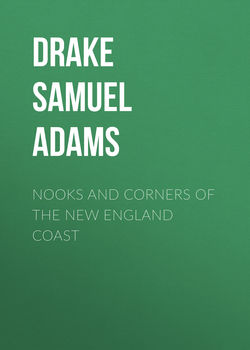Читать книгу Nooks and Corners of the New England Coast - Drake Samuel Adams - Страница 9
CHAPTER IX.
AGAMENTICUS, THE ANCIENT CITY
Оглавление"Land of the forest and the rock,
Of dark-blue lake and mighty river,
Of mountains reared aloft to mock
The storm's career, the lightning's shock —
My own green land forever."
Whittier.
Ho for Agamenticus! It is an old saying, attributed to the Iron Duke, that when a man wants to turn over it is time for him to turn out. As there are six good miles to get over to the mountain, and as many to return, I was early astir. The road is chiefly used by wood teams, and was well beaten to within half a mile of the hills. From thence it dwindled into a green lane, which in turn becomes a foot-path bordered by dense undergrowth. Agamenticus is not a high mountain, although so noted a landmark. There are in reality three summits of nearly equal altitude, ranging north-east and south-west, the westernmost being the highest. At the mountain's foot is a scattered hamlet of a few unthrifty-looking cabins, tenanted by wood-cutters, for, notwithstanding the axe has played sad havoc in the neighboring forests, there are still some clumps of tall pines there fit for the king's ships. You obtain your first glimpse of the hills when still two miles distant, the road then crossing the country for the rest of the way, with the mountain looming up before you.
Along shore, and in the country-side, the people call the mount indifferently "Eddymenticus" and "Head o' Menticus." Some, who had lived within a few miles of it since childhood, told me they had never had the curiosity to try the ascent. One man, who lived within half a mile of the base of the western hill, had never been on any of the others. The name is unmistakably of Indian origin. General Gookin, in his "Historical Collections of the Indians in New England," written in 1674, has the following in relation to the tribes inhabiting this region: "The Pawtuckett is the fifth and last great sachemship of Indians. Their country lieth north and north-east from the Massachusetts, whose dominion reacheth so far as the English jurisdiction, or colony of the Massachusetts, now doth extend, and had under them several other small sagamores, as the Pennacooks, Agawomes, Naamkeeks, Pascatawayes, Accomintas, and others."68
The climb is only fatiguing; it is not at all difficult. The native forest has disappeared, but a new growth of deciduous trees, with a fair sprinkling of evergreens, is fast replacing it. In some places the slender stems of the birch or pine shoot up, as it were, out of the solid rock. Following the dry bed of a mountain torrent, and turning at every step to wonder and admire, in half an hour I stood on the top. The summit contains an acre or more of bare granite ledge, with tufts of wiry grass and clumps of tangled vines growing among the crevices. Some scattered blocks had been collected at the highest point, and a cairn built. I seated myself on the topmost stone of the monument.
A solitary mountain lifting itself above the surrounding country is always impressive. Agamenticus seems an outpost of the White Hills, left stranded here by the glacier, or upheaved by some tremendous throe. The day was not of the clearest, or, rather, the morning mists still hung in heavy folds about the ocean, making it look from my airy perch as if sky and sea had changed places. Capes and headlands were revealed in a striking and mystical way, as objects dimly seen through a veil. Large ships resembled toys, except that the blue space grasped by the eye was too vast for playthings. Cape Elizabeth northward and Cape Ann in the southern board stretched far out into the sea, as if seeking to draw tribute of all passing ships into the ports between. Here were the Isles of Shoals, lying in a heap together. That luminous, misty belt was Rye Beach. And here was the Piscataqua, and here Portsmouth, Kittery, and Old York, with all the sea-shore villages I had so lately traversed. As the sun rose higher, the murky curtain was rolled away, and the ocean appeared in its brightest azure.
The sea is what you seldom tire of, especially where its nearness to the chief New England marts shows it crowded with sails bearing up for port. Craft of every build, flags of every nation, pass Agamenticus and its three peaks in endless procession – stately ships
"That court'sy to them, do them reverence
As they fly by on their woven wings."
Old Ocean parts before the eager prow. You fancy you see the foam roll away and go glancing astern. Here is a bark with the bottom of the Tagus, and another with the sands of the Golden Horn, sticking to the anchor-fluke; and here a smoke on the horizon's rim heralds a swifter messenger from the Old World – some steamship climbing the earth's rotundity; and yet water, they say, will not run up hill! When I looked forth upon this moving scene my lungs began to "crow like chanticleer." I waved my hat, and shouted "a good voyage" to sailors that could not hear me. I had no fear of listeners, for the Old Man of the Mountain tells no tales. To stand on a mountain-top is better, to my mind, than to be up any distance in a balloon. You have, at least, something under you, and can come down when you like. What a fulcrum Agamenticus would have made for the lever of Archimedes!
68
"Massachusetts Historical Collections," 1792, vol. i.
